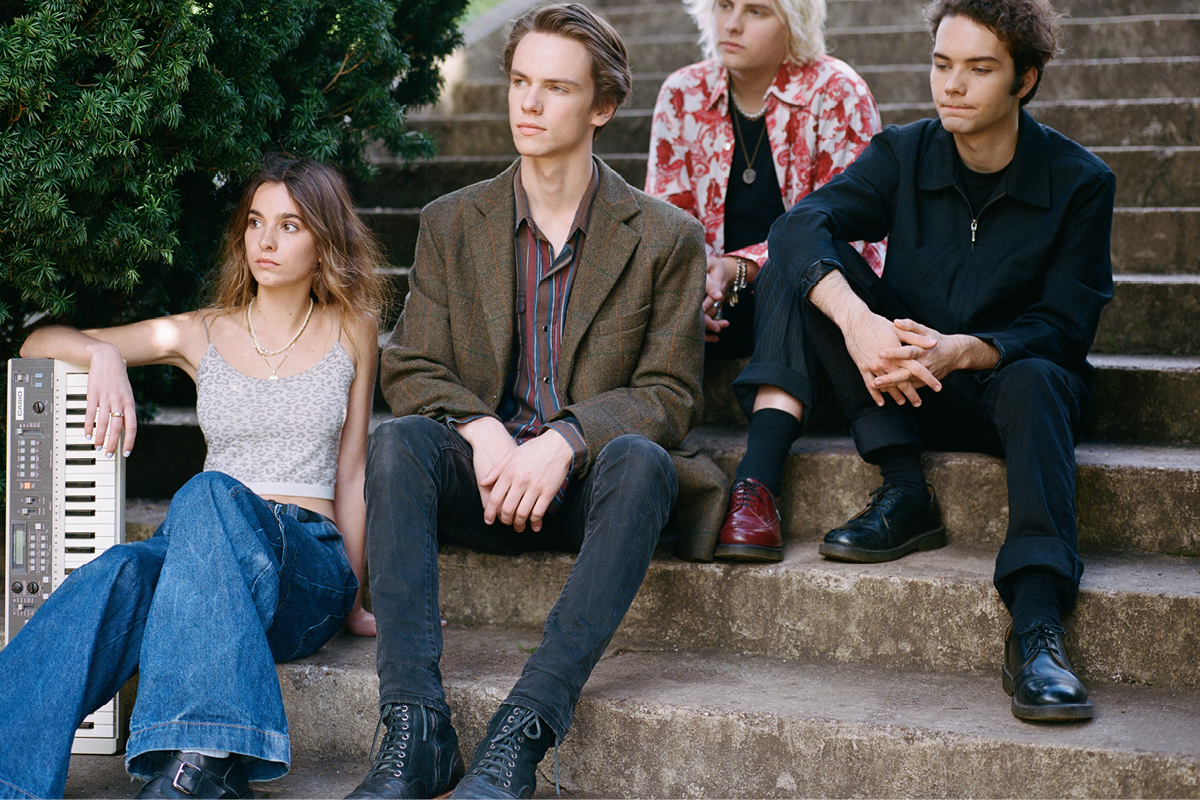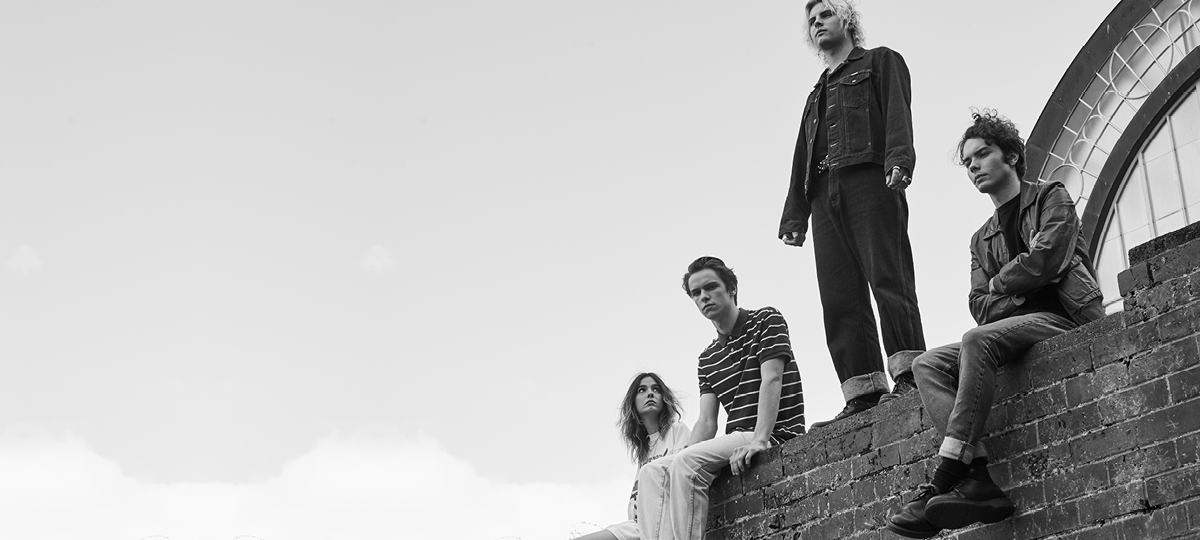
Since sharing their debut single and music video at the end of 2017, local band Daffodils have been on the rise - opening for the likes of Foals and Pale Waves, and playing Laneway Festival this year, with their songs (equal parts inspired by the 1980s and The 1975) adding a unique sound to the world of New Zealand music.
We spoke with the band ahead of their debut EP release about the lead single 'Boys', the importance of capturing their live energy in recordings, and much more...
...any musical genre can be relevant if you make it relevant. It’s about your personality as your artist and what you’re putting out, and if it’s good, people will listen to it. I feel like genre boundaries aren’t really a thing so much anymore.
[This interview is available as part of our NZ On Air physical print zine which is free! Click here for more info.]
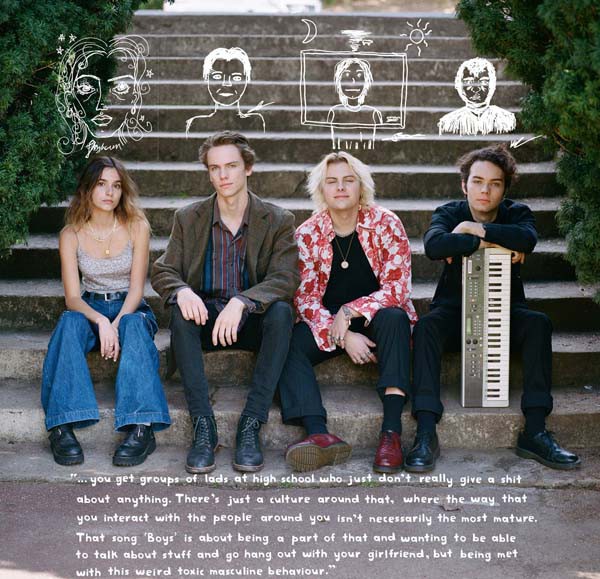
COUP DE MAIN: You’ve played so many live shows since we last interviewed you - Laneway Festival, supporting Foals, and supporting Pale Waves! Have you found that live shows have helped develop the recorded Daffodils sound?
THEO SPIKE SALMON: Definitely, it’s what we aim for in our recordings. The recordings try to reflect what the live thing is like for us - you want to get that kind of energy in it, because that’s the point.
CDM: How do you go about capturing the live sound in a recorded song?
THEO: We track the drums with everyone playing, so that gives it a really good energetic base for stuff. Isaac [Keating; the band’s drummer] gets a bit annoyed because we spend like one day doing all the drum parts, and he’s knackered by the end of it.
ISAAC KEATING: Yeah, we rush through it.
THEO: That’s what you’ve got to do on a budget.
ISAAC: Tracking with the live band is good, it gets that essence down first, and then you layer over when you’re playing with the band, you perfect it later, to add guitars and overdubs.
THEO: You put down a bunch of guide tracks for everything and then you can run off the top of that. It keeps that same live energy of everyone playing in a room together, which I think is really cool. I think we build it up quite a lot, and then strip it back to what the essentials are. When we’re playing live, we can only really have one keyboard part, one guitar part, three vocals parts, and drums - we don’t really tend to do any crazy overdubs or anything. For the most part it’s just mucking around with the things we already have, and maybe adding some textural things. We try not to add anything that we can’t do live.
CDM: It’s interesting that you do more and then strip it back. How do you decide what to include in a final song?
THEO: It’s just about listening to it, over and over until you realise what stuff you need and what stuff you don’t.
LOUIS GRAHAM: It’s not hard. We just know what’s too much. Whatever sounds natural.
THEO: You always end up releasing a song and then going back a few months later and being like, “Damn, I wish I kept that part in.”
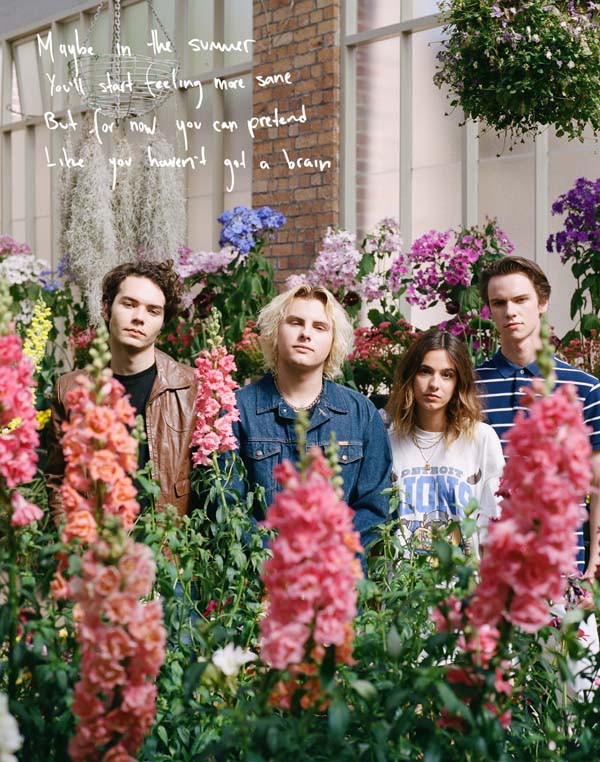
CDM: Then you can add bits into the live show that aren’t in the recordings, to make it have a slightly different feel?
THEO: Yeah! And they should be different things, so we just want to make sure we keep that energy there. I think it’s really easy to do all this crazy stuff in the studio and then not be able to pull it off live. It’s easier to put the energy in simple stuff live, when we’re not mucking around with tracks or click-tracks; all of that, which gets a bit too much for all of us to think about. Too many technical problems.
CDM: How do you feel having gotten to open for so many acts that you guys look up to, like Foals?
THEO: It’s pretty nuts.
LOUIS: Foals was pretty crazy for us.
THEO: They were such cool dudes as well.
LOUIS: When we arrived, Yannis [Philippakis] was just at the door and was like, “Hey guys, how’s it going?”
THEO: He held the door open for us when we loaded in, which was really nice.
CDM: Do you take a lot away from those experiences, as well as being able to see their shows?
THEO: Definitely. It impacts you a lot as a small band when a bigger band will come out and watch your set or interact with you at a show like that. I’ve always heard stories about people going and supporting bigger artists and they never actually got to meet that artist, which seems like such a weird thing to me. There’s a lot to learn from big artists, but there’s a lot to learn from smaller artists too.
CDM: It’s weird how it’s so competitive, when it should be more of a community.
THEO: I feel like New Zealand is a really supportive community within itself, so I think that is really cool. But when people come over from overseas they’re not quite used to that, you don’t get that so much in the US I don’t think, it’s way more like an ‘every man for themselves’ type situation.
CDM: What was running through your mind when writing the new song ‘Boys’?
LOUIS: What was that, four years ago?
THEO: It wasn’t that long ago! No, I think I wrote it in 2017, in my last year of high school. We’ve been playing it live for ages. It has kind of come away in terms of the meaning behind it, but my intention with it was to do with… you get groups of lads at high school who just don’t really give a shit about anything. There’s just a culture around that, where the way that you interact with the people around you isn’t necessarily the most mature. That song is about being a part of that and wanting to be able to talk about stuff, go hang out with your girlfriend, but being met with this weird toxic masculine behaviour.
CDM: Have you been working on the song on-and-off since 2017?
LOUIS: I think it had a second iteration.
THEO: It hasn’t changed a lot in its intention, it still follows that original line of intent.
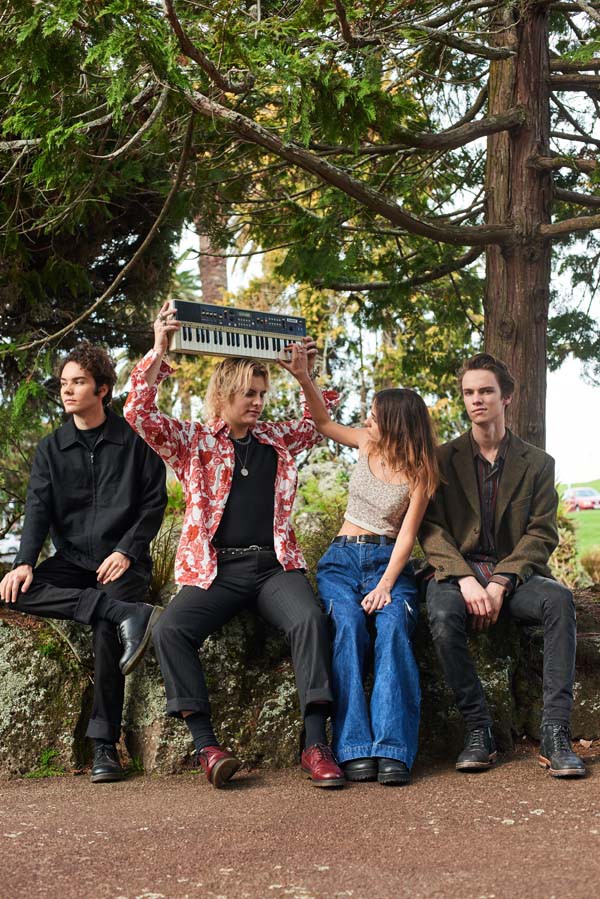
CDM: Do you feel like the way you write lyrics is something that’s growing as you continue to grow up and grow as a person?
THEO: I’d hope so. It’s interesting with that song as well because it wasn’t intended to be a diss at anyone, it was supposed to be a ‘looking at that from the perspective of being part of it’, and trying to figure out where the line is where you can mature a bit. For me, as a lyric-writer, I was trying to figure out how I could get that across in a way where it was fun but also was something to think about, and in a way that would appeal to the people who need to hear that.
LOUIS: But also if you were a lad with toxic masculinity, they’d also be really into the song if they didn’t look too deeply into it.
THEO: I don’t want to profess it as a deep song, but my intention for it was so that people could go, ‘Oh yeah, maybe I’ll be a bit more open about how I actually feel about stuff.’ It’s still a fun song. I don’t know if I’m at the point as a lyric-writer to come out with something that’s mega profound or world-changing, but taking what we all experience as New Zealanders and as growing up, I feel like there’s a lot of small stuff that can be taken from experience that you can write about and have it affect someone in a positive way.
CDM: Theo, you met Jade at a The 1975 concert right? It’s so cool to see these waves of new musicians that come together while at a show of someone they love!
THEO: It was, technically! We met briefly at the 2015 show at Logan Campbell Centre. What happened after that? I think I hit Jade up on Instagram.
CDM: Did you know you had a mutual love of music?
THEO: I think I saw Jade post something about wanting to start a band - like, Catfish And The Bottlemen, Arctic Monkeys vibes. We didn’t actually start the band for ages though, we had just been mates for a year or two.
CDM: How did the rest of you come together as the band?
ISAAC: Me, Louis, and Theo have know each other since intermediate school. My first band was with them, we’ve just always played together. Every band we’ve been in had at least one of us; we’ve had a few other bands. So we’ve always been playing together, these are the only guys that I’ve known as musicians who I’ve just always played with, so it’s just really easy to communicate.
THEO: I think you get into circles with people where you really connect with people, on a jam-my level.
LOUIS: I think when you [points at Theo] had the idea for this band, it just happened - there was no mucking around, it was just band practice with the four of us.
THEO: Originally, me and Jade were like, ‘We’re going to make a band,’ and Jade was going to play bass, and then she didn’t want to do it.
JADE BRYHAM: I was a bit shit at it. <laughs>
THEO: Then we got Louis - he wasn’t a bass player before we started this - and he’s just taught himself. We thought he could be an interim bass player until we found someone and then he could move to guitar, but then he just stuck on the bass. We just kept it like that because it worked.
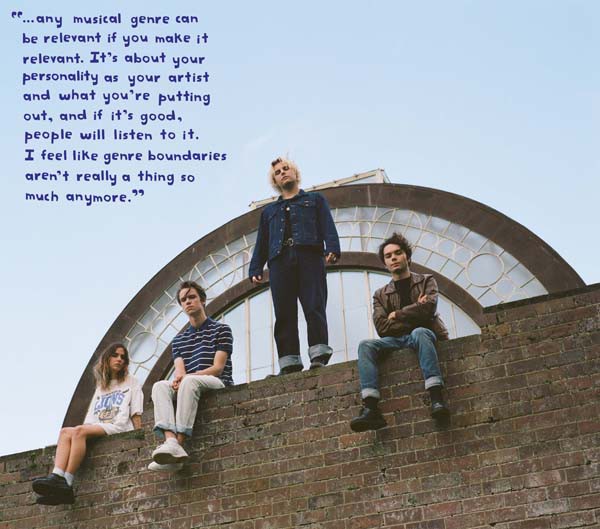
CDM: For you guys, existing as a guitar band in 2019, it’s a highly debated thing about the relevancy of rock music in today’s world of pop music. Looking back on New Zealand’s history of rock music and comparing it to today with most big exports being pop music, how do you feel about existing in that space?
THEO: I think any musical genre can be relevant if you make it relevant. It’s about your personality as your artist and what you’re putting out, and if it’s good, people will listen to it. I feel like genre boundaries aren’t really a thing so much anymore.
LOUIS: We slip between the genres a little bit.
THEO: There’s still people that will be like, “I’ll never listen to metal, that’s not real music,” or some idiots that are like, “Rap isn’t real music, they don’t even have melodies,” and that’s all nonsense. I feel like back when my Dad was a teenager it was really tribal - there were people who listened to punk, people who listened to metal, people who listened to pop, and they wouldn’t even socialise with each other. Now, everyone has playlists that are full of everything from The 1975 to Charli XCX.
CDM: People aren’t so segregational about it now.
THEO: You get metalheads who secretly listen to a bit of Destiny’s Child in their spare time.
LOUIS: I just like music and artists. I feel like guitar will always be a part of music though. In pop music, it comes in waves.
THEO: It’s always going to be a platform for people to write their songs on, and I think as well as that, there’s something really raw and visceral about going and seeing a band that plays acoustically, in terms of having a standard drum kit and everything amped up. Everything being in that loose live format, is something that people will always latch onto.
LOUIS: There’s such a huge difference to having live drums and having a track; it makes the biggest different.
THEO: I feel like live music should be a bit chaotic. You’re not going there to see a perfect show. That’s why you either do a completely raw, stripped-down thing, or something like Taylor Swift where you have this huge, incredible show.
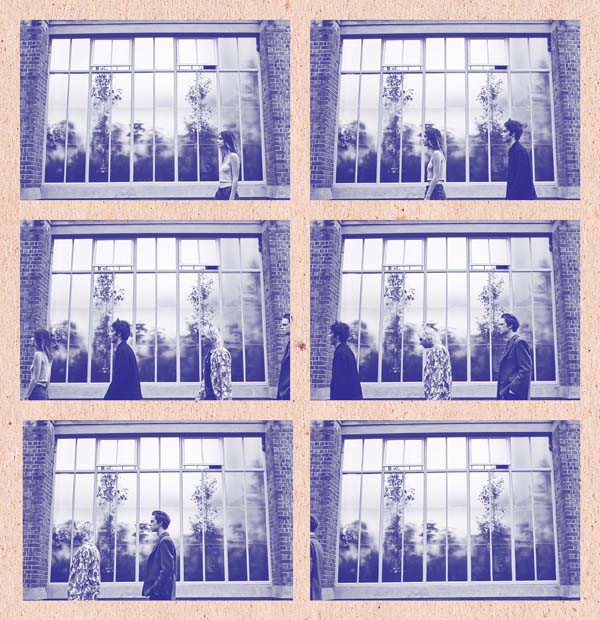
PHOTOGRAPHY BY KAREN ISHIGURO
GROOMING BY HAZEL XU
Daffodils' 'Boys' EP is out now - listen to it below...

